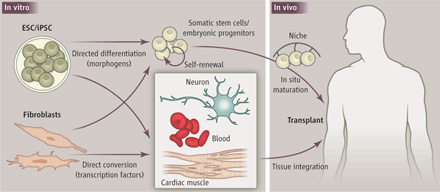Our laboratory focuses on stem cell biology, with an emphasis on hematopoietic differentiation from human and mouse pluripotent stem cells (embryonic stem cells, ESC, and induced pluripotent stem cells, iPSC), epigenetic reprogramming, and the overlap between stem cells and cancer. Our goals are:
- Hematopoietic development: ESC/iPSC are pluripotent stem cells, yet mechanisms of directed differentiation into HSC and models for functional engraftment remain poorly defined. We study hematopoietic development in mouse embryos and we differentiate mouse and human ESC/iPSC into HSC in vitro to define the molecular genetic programs that enable formation of HSC in experimental and therapeutic models.
- Derivation of personalized, patient-derived pluripotent stem cells: We also develop human disease models based on iPSC generated from reprogramming of somatic cells obtained from patients with a variety of diseases. We then use these disease models to discover novel disease mechanisms, develop drug therapies, and deliver curative cell transplants after genome editing.
- Stem cells, regeneration and cancer: We are exploring developmental pathways that commonly influence the germ lineage, various stem cell compartments and tumorigenesis. Most studies focus on the Lin28/Let7 axis, which we have linked to developmental timing, the balance of self-renewal vs. differentiation in stem cell populations, tissue repair and tumor formation.

